[ad_1]

The different polls all agree: President Joe Biden’s political standing is lower than Barack Obama’s was at this point before his re-election — and even lower than Donald Trump’s was a year before his 2020 loss.
Last month’s national NBC News poll found Biden’s approval rating declining to 40%, the lowest mark of his presidency. (That compares with Obama’s 46% among all adults in December 2011 and Trump’s 44% in December 2019, according to past editions of the poll.)
The findings are consistent with other national and battleground-state polling showing Biden’s approval rating in the 30s and 40s.
What’s more, Biden ended the year narrowly trailing Trump in a hypothetical head-to-head matchup in the NBC News poll, albeit within the margin of error — which Obama never did against Mitt Romney in the 2012 election cycle.
Other polls also find Biden in a highly competitive 2024 contest with Trump.
And maybe most concerning of all for Biden, the NBC News poll and other surveys indicate that the Democratic coalition has frayed less than a year before the 2024 general election, with Biden experiencing declining approval ratings not just among independents but also among young voters, Latinos and even Black voters.
“On every metric, Joe Biden is in a weaker position today than when he won the 2020 election,” said Democratic pollster Jeff Horwitt, who co-conducts the NBC News poll with Republican Bill McInturff.
The culprits behind Biden’s precarious position include inflation and wages’ not keeping up with prices, concerns about Biden’s age and fitness and the Israel-Hamas war, which has resulted in some younger voters’ turning against him.
“Democrats cannot generate a national majority without a strong showing of younger voters,” Democratic pollster Cornell Belcher said.
Still, these Democratic strategists and others believe Biden’s poll slump — as it stands right now — isn’t predictive of what might happen in next November’s general election. And they pointed to several factors to watch for over the next year that could have impacts on his standing.
When Trump takes the stage — and possibly the stand
For starters, Democrats argue that Biden could benefit at Trump’s expense from the multiple trials and legal challenges Trump faces in 2024.
“At the moment, the focus is more on Joe Biden than Trump,” said Horwitt, the Democratic pollster. “But that is likely to change over the course of 2024, as a quartet of Trump trials and testimony takes center stage.”
Indeed, a recent national New York Times/Siena College poll found half of independents and even 13% of self-described Republicans believing Trump should be found guilty of trying to overturn the results of the 2020 presidential election — attitudes that could matter in a close election.
Democratic strategist Simon Rosenberg said, “Trump’s Olympian levels of baggage and the struggles of MAGA in 2018, 2020, 2022 and 2023 are being wildly over-discounted right now,” referring to Trump’s “Make America Great Again” political movement.
The GOP’s losing record after Roe’s reversal
What’s also being discounted right now, Rosenberg said, is the Democratic Party’s performance in elections after the Supreme Court overturned Roe v. Wade and the constitutional right to an abortion.
That election performance includes the Democrats’ keeping control of the Senate after the 2022 midterms, as well as key electoral victories in Kentucky and Virginia in November.
“To me, the most important electoral data we have right now is the heightened Dem performance since Dobbs that has carried over to 2023,” Rosenberg said, referring to the Supreme Court decision that overturned Roe v. Wade.
“As a professional, I would much rather be the one winning elections in all their complexity … than being the one who may have a slight advantage in the polls 11 months out and keeps losing and underperforming with actual voters,” he continued.
Political analysts have attributed Democrats’ electoral successes last year and this year to a political realignment in which Democrats have become more frequent voters in lower-turnout elections. The question is whether that success translates in the higher-turnout presidential election in 2024.
When economic perception catches up to the economic performance
Democrats also remain bullish that the positive national economic numbers — an unemployment rate below 4%, the hundreds of thousands of jobs that are being created each month, the slowing rate of inflation — could translate into more positive personal attitudes about the economy in 2024, despite the public’s negative views of Biden’s handling of the issue.
Just 38% of voters said they approved of Biden’s economic record in the November NBC News poll.
“The economy, including the cost of living, is showing real and significant signs of improvement,” said Horwitt, the Democratic pollster.
“Unlike the 1992 election, when George H.W. Bush’s advisers lamented the fact that economic improvements came too late for voters to feel back then, there are powerful signs that we are likely to avert a recession and inflation’s impact may start to ebb.”
What if views of Biden are locked in?
But here’s what worries Democrats: the chance that views of Biden are already set — no matter what happens to Trump in the courtroom or if perceptions of the economy improve.
For Horwitt, the pessimistic case for Democrats is if “views on Biden are locked in and he is not able to shift the focus back to Trump.”
Also worrisome for Horwitt is if “turnout among younger, Black and Latino voters craters and, at the same time, his margins with these voters are not as great as they were in 2020.”
Then there’s the potential impact of third-party candidates who could serve as viable protest votes for disaffected Biden voters, Horwitt added.
And the size of the third-party vote matters, given Trump’s apparent ceiling of 46% to 47% in the 2016 and 2020 elections.
“Trump is a 47% candidate — the majority of Americans will never support him,” said Belcher, the Democratic pollster. “Trump only wins by subtraction, not addition.”
[ad_2]
Source link
